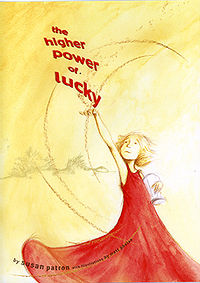In addition to winning the Newbery, Higher Power of Lucky was reviewed positively by several publications:
- Booklist said, "Patron's plotting is as tight as her characters are endearing. Lucky is a true heroine, especially because she's not perfect: she does some cowardly things, but she takes pains to put them to rights."
- Horn Book featured the title as a starred review and said, "Author Patron's tale of a grieving, insecure little girl is never heavy-handed or maudlin, due in part to quiet bursts of humor. Quirky supporting characters include future presidential hopeful and knot artist Lincoln Clinton Carter Kennedy, Lucky's best friend; and recovering alcoholic/hippie/cowboy Short Sammy."
- Kirkus also gave the title a starred review and said, "Readers will gladly give themselves over to Patron, a master of light but sure characterization and closely observed detail. A small gem."
- Publisher’s Weekly said, “Though Lucky's ponderings sometimes grow repetitive, the sympathetic, pleasingly quirky characters define this tightly-knit hardscrabble community, affectionately portrayed in Phelan's half-tone illustrations.”
- School Library Journal said, “This character-driven novel has an unusually complicated backstory, and a fair amount of exposition. Yet, its quirky cast and local color help to balance this fact, and the desert setting is fascinating.”

